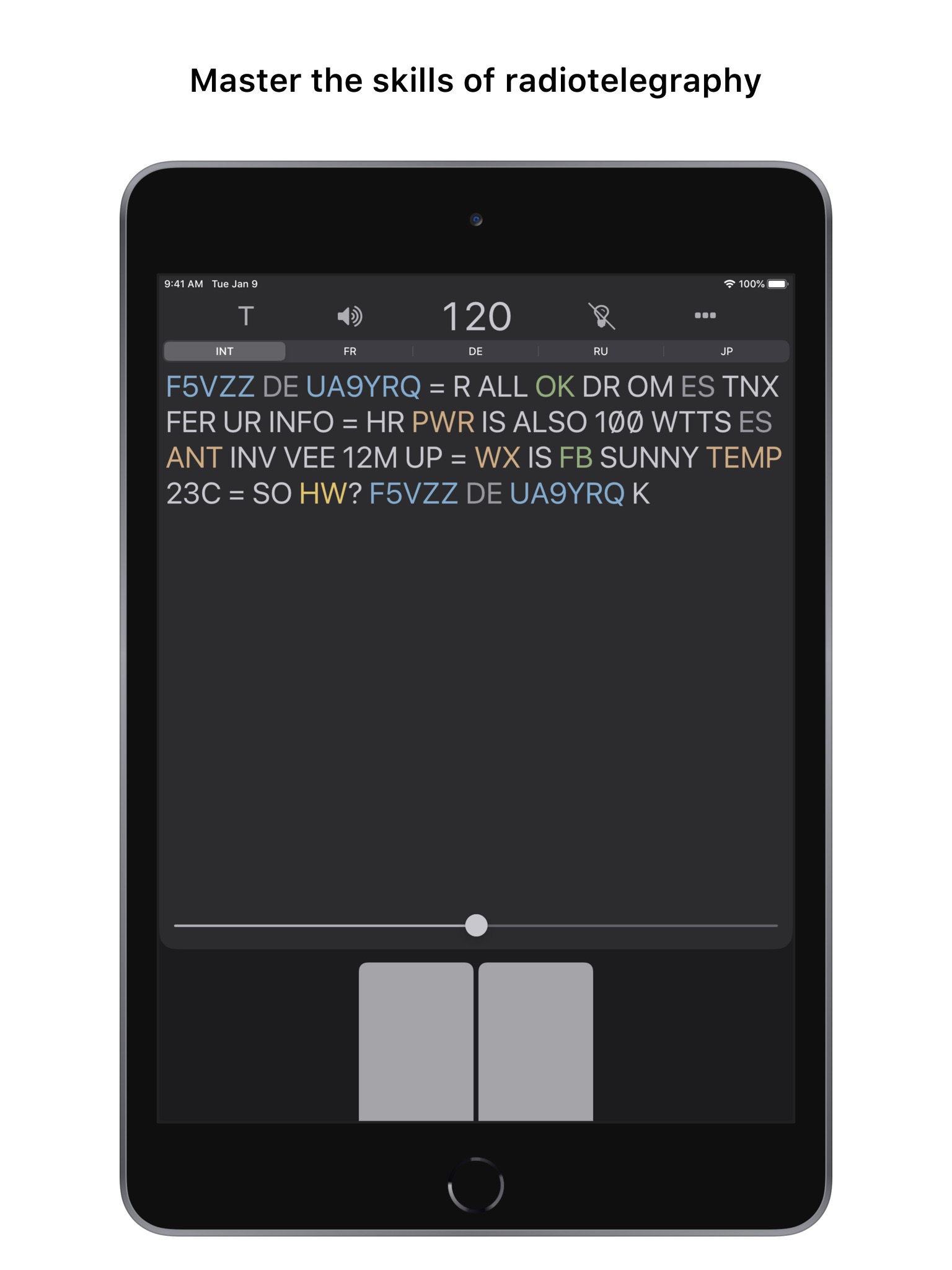
The app operates like a real electronic keyer with a dual-lever paddle, dot and dash memories and various keying modes including "iambic". It produces a series of short sound signals (dots) when one of the paddles is pressed and a series of long signals (dashes) when the other one is pressed.
Letters, digits, procedural signals (prosigns) and other transmitted symbols are displayed on the screen. Additionally, Morse code abbreviations used in amateur radio, maritime, aviation and military communications are recognized and formatted appropriately.
ADVANCED CW KEYER
The keyer buffers paddle presses, that eases the manipulation and helps to transmit at higher speeds. High accuracy of generated signals contributes to high-quality transmission of Morse code.
Keying modes:
- Ultimatic — "last paddle wins"
- Iambic (modes A and B)
- Single lever
- Semi-automatic, aka "bug"
EXTENDED MORSE CODE
When displaying the transmitted text, the app "knows" in addition to International Morse code a number of extensions for different languages. Supported alphabets include Japanese (Wabun code), Greek, Cyrillic-based and Latin-based alphabets with diacritical marks.
The app recognizes details and nuances of Morse code for the following alphabets:
Belarusian, Bosnian, Bulgarian, Croatian, Czech, Danish, Dutch, English, Esperanto, Estonian, Finnish, French, German, Greek, Hungarian, Icelandic, Italian, Japanese, Latvian, Lithuanian, Macedonian, Moldovan, Montenegrin, Norwegian, Polish, Portuguese, Romanian, Russian, Serbian, Slovak, Slovenian, Spanish, Swedish, Turkish, Ukrainian.
SMART DISPLAY
MorseKeyer does a lot to display the Morse code you transmit in the most readable form. For this purpose the app is equipped with the following functions:
- Sophisticated text formatting
- Dynamic switching between alphabets
- Reasonable representation of errors
These innovative features use multilevel content analysis to detect CW abbreviations, Q-codes, Z-codes, amateur radio callsigns and other special words.
SOPHISTICATED TEXT FORMATTING
The transmitted text can be displayed not only in the traditional all-capital format, but also using a kind of "smart" formatting. In this mode each word is displayed in the accepted form, as in the following CW session snippet:
GM dr OM tnx fer call = ur RST is 599 = my QTH is nr London
DYNAMIC SWITCHING BETWEEN ALPHABETS
Even if you choose to use a non-Lating version of Morse code in your communication session, special words and Morse code abbreviations still can be displayed in Latin script.
- In Wabun code the prosigns DO and SN as well as codes for Japanese parenthesis indicate switching between International and Japanese alphabets. MorseKeyer follows this convention and switches alphabets in such cases automatically.
- A Cyrillic alphabet can be selected as the primary one to display most of the transmitted text, but all Morse code abbreviations and special words (CQ, de, ur, RST, my, QTH, name, tnx, etc.) as well as callsigns can still be represented in Latin script.
REASONABLE REPRESENTATION OF ERRORS
If you transmit a non-existent Morse code sign, the app displays it either as a dot-dash sequence or in another form depending on the current settings. In many cases MorseKeyer highlights a mistake, indicating its source and making it readable.
ADVANCED SETTINGS
MorseKeyer is ready to use out of the box. However, it has a lot of settings allowing you to fine tune it, customize and make more convenient in different use cases.
NICE SOUND
A special attention in the app is paid to the sound signal quality, its timbre, the optimal level of clicks and other characteristics, that make the sound of Morse code authentic and recognizable by any radio operator and comfortable to listen to.



